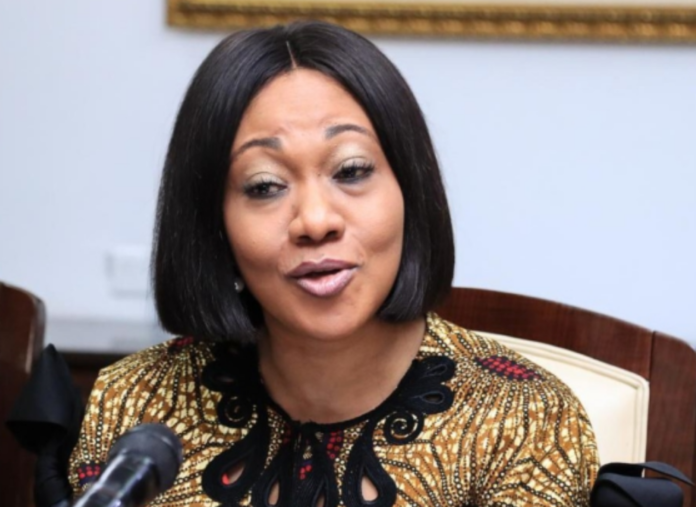The Electoral Commission (EC) saved the country $90 million in the conduct of the 2020 Election, the Chairperson of the commission, Mrs Jean Mensa, has disclosed.
That, she said, was achieved through a reduction of the cost of the election from $13 per person in 2016 to $7.7 in 2020.
Moreover, it also cut down the time it took a voter to vote from 10 to 12 minutes per voter to three to five minutes.
Mrs Mensa said Election 2020 was also the first election in the Fourth Republic to be fully funded by the government, with no donor funding to support the election management processes.
She was addressing the opening ceremony of the high-level parliamentary seminar on: “Two decades of democratic elections in ECOWAS member states: Achievements, challenges and the way forward”, in Winneba yesterday.
Transparency
The Chairperson of the EC said the commission achieved those feats, in spite of inflation, price hikes and the additional cost it incurred owing to the COVID-19 protocols it deployed throughout the election processes.
“I humbly refer to Ghana’s 2020 elections as historic for the transparency, credibility, cost-effectiveness, high turnout and peaceful conduct that characterised them. So orderly, so methodical, so calm were the polls on 7th December, 2020 that BBC Africa could find no other way to describe our elections than ‘boring’,” she said.
According to her, the elections were historic because “we conducted all our electoral processes and elections at the height of the COVID-19 pandemic, without the spread of the virus”.
Democracy
Mrs Mensa said elections were one of the most significant building blocks of a democracy, as they helped preserve the sanctity of a democracy.
“Through elections, a people exercise their sovereign will to choose their own leaders, and through electoral laws and processes, a nation unites under the common purpose of protecting that sovereign will,” she said.
She, however, said elections and the processes that preceded them “sometimes prove divisive and de-stabilising and threaten the very cohesion they are designed to provide”.
MORE:
Key role
She said everyone had a key role in determining whether, going into the next two decades, “ours will be a story of a rising Africa, an inspiration and a repository of best practices for the lasting benefit of generations yet unborn, or whether it will be another sad African tale of a lost legacy and a broken promise to a generation that looked to us with hope”.
Mrs Mensa said the December 2020 elections in Ghana proved that the story of elections in the sub-region could. indeed. be an inspiration.
“That our story as West African states can be one that brings hope to our youth and light to the coming generation, and that we can provide best practices that the most advanced democracies of the world can learn from. Yes, we can,” she declared.
Odds and challenges
According to her, Ghana proved that elections in the sub-region could be efficiently conducted, in spite of the odds and challenges.
She noted, for instance, that the global COVID-19 pandemic caused a major disruption to Ghana’s election timetable as a result of the uncertainty, as well as the fact that suppliers of electoral materials were unable to meet the procurement schedules owing to the global lockdown.
She said the EC had only six months to conduct the elections, and that within that short space of time, “we completed every electoral process, including introducing and deploying a new Biometric Voter Management System, comprising hardware and software, and preparing a new biometric voters register”.
“This and other electoral processes were undertaken within a space of six months, from June 30th, when we started the registration exercise, to December 9th, when we declared the results,” she stated.
Fears and projection
Mrs Mensa said in spite of the fears and projection of a low turnout as a result of the COVID-19 pandemic, the EC compiled an entirely new biometric voters register in 38 days only, successfully registering over 17 million eligible Ghanaians in that short period of time and exceeding its initial target of 15 million registrants.
“The efficiency of our coverage in the voter registration exercise has been attested to by the recently released population census figures that place Ghana’s population at 30.8 million. The 17,027,000 voters on the register represents 55.2 per cent of the population of Ghana; a percentage that fully meets international standards for the registration of voters.
She said Ghana proved that electoral processes in West Africa could be transparent, as all the electoral activities were conducted in the full glare of the public.
Let the Citizen Know
The Chairperson of the EC said to further enhance the culture of transparency, the EC constantly engaged the public and the media in twice-weekly encounters dubbed: “Let the Citizen Know”, in the run-up to the elections.
“On this platform, we provided citizens with information on ongoing electoral activities and answered their questions and concerns. This helped to open up our process and demystify our work.
“Again, through this platform, we provided swift responses and facts to counter fake news, thereby substantially reducing the tension and suspicions that usually arise from fake news and the lack of information,” she said.
Collation of results
Mrs Mensa said on voting day, the EC introduced a new layer of scrutiny of the electoral process by introducing a regional level of collation of results.
“The Regional Collation centres enabled party agents to further scrutinise, affirm and collate results from constituencies within their regions before submission to the National Collation Centre. This further deepened the transparency of our elections and reduced the tension and suspicion that foment during long waits for constituency level results,” she said.
According to her, in the past, the EC waited for all 275 constituency results, but this time around it received 16 regional results, stressing that “this innovation introduced efficiency in the collation of results and enabled us to declare the results in a record 48 hours”.

